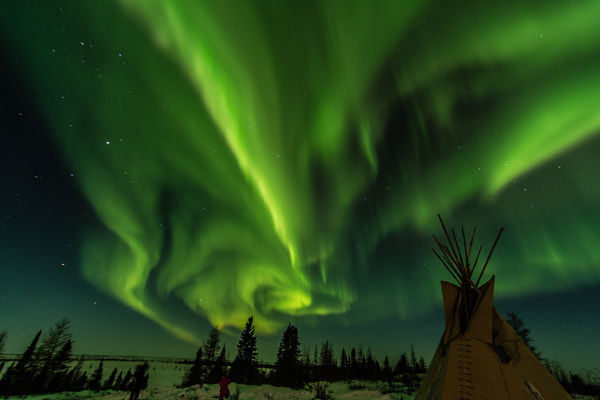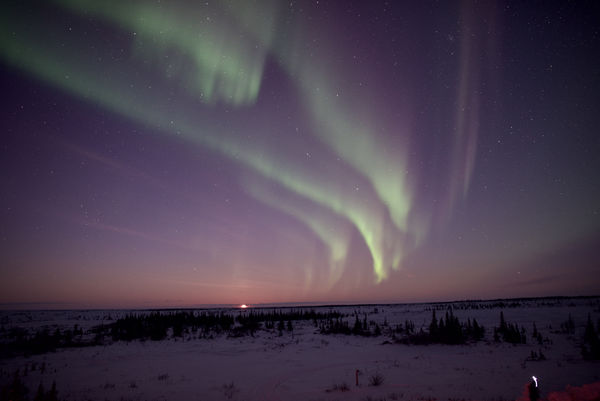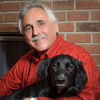Suggestions for a Full Frame Camera for Cold Polar Conditions
Nov 4, 2019 23:25:10 #
Greetings Fellow Photo Finatics,
I have been reading your opinions for a while now and want to ask all of you a not so simple question.
This is regarding the purchase of a Canon Full Frame Digital Camera. I am retireing and have the funds to make the purchase but I would like those of you willing to share your experence and oponions. Perhaps in your past you purchased the camera you thought would cover all the bases but found it was lacking during your various uses. Thats what I would like to discuss; your colictive experences, and what would you purchase if you could do it all over again?
I have a Leika V-Lux 1 & a Leika V-Lux 2 and love them both.
My concern is both cameras have plastic bodies.
My wife and I are going on a bucket list trip to see the Northern Lights up in Canada. Great odds to see the lights however really cold conditions. This seems like the conditions that a metal alloy body vs a plastic body could be a game changer. Meaning a camera that would not work. I wanted to open this up for discussion as a new inqusitive member and glean off of your collective experences.
I would like to stick with Canon cameras and am also wondering about the good and bad of mirror vs mirrorless digital. This is for shooting the Northern Lights .
Lots of questions and I am looking forward to your replies.
Best Regards, Conley
I have been reading your opinions for a while now and want to ask all of you a not so simple question.
This is regarding the purchase of a Canon Full Frame Digital Camera. I am retireing and have the funds to make the purchase but I would like those of you willing to share your experence and oponions. Perhaps in your past you purchased the camera you thought would cover all the bases but found it was lacking during your various uses. Thats what I would like to discuss; your colictive experences, and what would you purchase if you could do it all over again?
I have a Leika V-Lux 1 & a Leika V-Lux 2 and love them both.
My concern is both cameras have plastic bodies.
My wife and I are going on a bucket list trip to see the Northern Lights up in Canada. Great odds to see the lights however really cold conditions. This seems like the conditions that a metal alloy body vs a plastic body could be a game changer. Meaning a camera that would not work. I wanted to open this up for discussion as a new inqusitive member and glean off of your collective experences.
I would like to stick with Canon cameras and am also wondering about the good and bad of mirror vs mirrorless digital. This is for shooting the Northern Lights .
Lots of questions and I am looking forward to your replies.
Best Regards, Conley
Nov 5, 2019 00:02:55 #
I can't advise on Canon cameras (since I shoot Nikon) but I would think that most modern full frame Canon camera's would stand up to the cold without any problem (at least that is true of every Nikon cameras I have used in the cold). The biggest problem I have seen is that people bringing in their freezing cold cameras and lenses frost up and the moisture can get in to cameras and lenses, preventing them from working. So be sure to get a camera and lens which is weather sealed. I too have wondered if a mirrorless might be better since there would be less vibration when shooting. I used a 7 second delay shooting with a DSLR so that the vibrations introduced by pushing the shutter would not effect the shot but an electronic trigger would be even better. There are many good ebooks that help prepare for shooting the Northern lights but the one thing I would strongly recommend is practice shooting at night in the dark before you go. Depending on who you are going with, they may have people to help you when you are there, but in the freezing cold you may find that your brain freezes up (at least mind did). Have fun and good luck!

Nov 5, 2019 02:14:01 #
I have both Canon and Nikon DSLR'S and I've never had any problem with them in very cold conditions. My everyday shooter is a Canon 5D mk IV that I have gone shooting with in sub zero F weather and it has worked flawlessly. I've never experienced any problems with the mirror causing any vibration distortion in any photos I've taken with any of my 3 Canon Full Frame cameras, not even the 5DSr with its 50 megapixel sensor. The mirror mechanism is quite complex and extremely well dampened to prevent any vibrations transferring to the images. Do you really believe Canon would market a camera for around $3500 that's susceptible to vibration distortion from its mirror?!
As far as DSLR vs MILC; Canon's full frame DSLR'S are pretty rugged. The 1DX series are exceptionally rugged and weather sealed and have been carried to the top of Mt. Everest. If cost is not an object, get a Canon EOS 1DX mk II and some L series lenses. The camera body goes for around $5500 full retail. Amazon has refurbished ones for around $4300. There is a 1DX mk III coming soon but it's not available yet and will probably cost over $6000.
The EOS R & RP are both good cameras but I'm not sure how rugged they are compared the the 5D mk IV.
Like I said, I've been using a 5D mk IV as my daily shooter for 3 years now, in all kinds of weather, and I've not had a single problem with it.
As far as DSLR vs MILC; Canon's full frame DSLR'S are pretty rugged. The 1DX series are exceptionally rugged and weather sealed and have been carried to the top of Mt. Everest. If cost is not an object, get a Canon EOS 1DX mk II and some L series lenses. The camera body goes for around $5500 full retail. Amazon has refurbished ones for around $4300. There is a 1DX mk III coming soon but it's not available yet and will probably cost over $6000.
The EOS R & RP are both good cameras but I'm not sure how rugged they are compared the the 5D mk IV.
Like I said, I've been using a 5D mk IV as my daily shooter for 3 years now, in all kinds of weather, and I've not had a single problem with it.
Nov 5, 2019 05:43:31 #
Resqu2
Loc: SW Va
I took my Canon 6D up on one of Virginia’s highest mountains in the middle of a snowstorm and very low temp. I think it was -25f with pretty good winds and had no issues. I’m on a 5D iv and would expect it to do as well if not better.
Nov 5, 2019 05:43:31 #
Resqu2
Loc: SW Va
I took my Canon 6D up on one of Virginia’s highest mountains in the middle of a snowstorm and very low temp. I think it was -25f with pretty good winds and had no issues. I’m on a 5D iv and would expect it to do as well if not better.
Nov 5, 2019 06:49:49 #
Don't worry about the plastic vs metal in the camera bodies, both can handle the cold. Just be sure you have charged extra batteries in your close-to-body pockets just in case the cold makes your camera batteries give up earlier than expected.
Nov 5, 2019 07:09:50 #
patman1
Loc: Pataskala, Ohio
Hi, I live in snow country in upstate NY, our Winters quite severe with heavy snows and sub zero temps. I have been using my Leica M series under these conditions and never had a problem, every thing works perfectly. I'm not saying you will have problems with your Nikon or Canon, I'm sure they will all get the job done. Just relating my experience. Good luck, have fun.
Nov 5, 2019 08:00:22 #
I've had a number of Canons and Nikons over the years and have had no problem vs. the cold with any of them in locations as diverse as Alaska's North Slope and Minneapolis when it was 20 below. Long ago, my principal concern was whether the film could handle the cold. :-)
Nov 5, 2019 08:35:18 #
The Canon EOS R is the only choice if you want to go mirrorless since it weather sealed, the EOS RP is not. It’s an excellent camera and lighter which is recommended for travel.
Nov 5, 2019 09:23:30 #
I think your Leica and any new camera you purchase will do fine in the cold. I have shot overnight time lapses in the winter using a variety of Canon, Nikon and Sony cameras. In my case, the limiting factor was the external battery providing enough power for the planned duration.
In your case, will you be standing out in the cold for long? If so, take extra batteries and keep the spares inside your coat next to you and switch out when required. Also, take precautions when bringing a cold camera indoors, there have been several threads on this on UHH.
Another method is to try some test shots based on other people's recommendations and your test shots, set up the camera in manual mode and shoot photos using an intervalometer while you stay inside. This is what I would do typically, set the camera up at night, pick it up in the morning and see what happened.
I have found that the weak link in the process of shooting outside in cold weather is not the equipment but the photographer. As much as I try, it is my feet or hands getting cold that derails the shoot.
In your case, will you be standing out in the cold for long? If so, take extra batteries and keep the spares inside your coat next to you and switch out when required. Also, take precautions when bringing a cold camera indoors, there have been several threads on this on UHH.
Another method is to try some test shots based on other people's recommendations and your test shots, set up the camera in manual mode and shoot photos using an intervalometer while you stay inside. This is what I would do typically, set the camera up at night, pick it up in the morning and see what happened.
I have found that the weak link in the process of shooting outside in cold weather is not the equipment but the photographer. As much as I try, it is my feet or hands getting cold that derails the shoot.
Nov 5, 2019 09:32:04 #
Pretty much every upper-tier camera manufacturer makes bodies that will perform in the cold.
Your choices are wide open and fairly safe.
Choose what you like or know.
Your choices are wide open and fairly safe.
Choose what you like or know.
Nov 5, 2019 09:56:09 #
Conley wrote:
Greetings Fellow Photo Finatics, br I have been re... (show quote)
Panasonic's new full frame mirrorless cameras (S1, S1R, S1H) are weather-sealed and rated for continuous operation down to -10C. The S1 is a 24.2MP body. The S1R is a 47.3MP body. the S1H is a 24.2MP hybrid body built primarily for videographers and filmmakers. It is jammed full of pro AV features.
They're not cheap, but you can mount Leica L-mount lenses, Panasonic L-mount lenses, and Sigma L-mount lenses on them. The lens line is rolling out relatively quickly: https://www.digitalcameraworld.com/news/l-mount-lens-roadmap-panasonic-promises-42-lenses-by-the-end-of-2020.
They don't make great ACTION cameras, due to the use of contrast-detect autofocus, but in nearly all other regards, they are excellent, rugged, and yield stunning results. For landscape and product photography and portraiture, they do a wonderful job. For video, the S1H is an alternative to low-end professional camcorders from Panasonic, Canon, and BlackMagic.
As for the dSLR/MILC contrast, mirrorless cameras have fewer moving parts, fewer lubricated parts, and let you see what you're going to get, in a bright electronic viewfinder.
As for Canon, unless you're using the 1Dx series, they're not known for superior low temperature/wet weather resistance.
Carry plenty of extra, fully-charged camera batteries, and keep them in an inner pocket against your body. Batteries can lose their ability to deliver 60 to 80 percent of their charge capacity in very cold weather.
Nov 5, 2019 10:00:51 #
ricardo00 wrote:
I can't advise on Canon cameras (since I shoot Nik... (show quote)
Another option - go to 500px.com and search for "northern lights". Look at what comes up and see which cameras were used. You will then know that those models are workable for the cold.
Nov 5, 2019 10:09:26 #
I'm not a "brand" guy, but I can tell you from experience in the past few years of shooting in sub zero temps that I've been able to continue shooting with my Nikon equipment, when Canon's froze up.
The big limiting factor for me was that my lenses froze, and wouldn't autofocus, even though I had them wrapped up with hand warmers and hand towels.
It was still better than the other cameras with their shutters frozen. Now, maybe my hand warmer thing kept the body warm enough to stop from freezing.
The big limiting factor for me was that my lenses froze, and wouldn't autofocus, even though I had them wrapped up with hand warmers and hand towels.
It was still better than the other cameras with their shutters frozen. Now, maybe my hand warmer thing kept the body warm enough to stop from freezing.
Nov 5, 2019 10:13:34 #
Having gone to Churchill (Churchill Northern Studies Centre) for the last 7 years for aurora season (Feb/Mar), we've had some great tutelage under Alan Dyer and David Marx taking aurora shots. Alan has some ebooks (see links below) that cover all aspects of cold weather shooting, etc. Patrick Endres of Alaska also has an ebook covering the same. Both should be able to answer your question and provide essential tips. Check out the links:
Patrick Endres
https://www.alaskaphotographics.com/how-to-photograph-northern-lights-ebook/
Alan Dyer
https://amazingsky.net/
http://www.amazingsky.com/nightscapesbook.html
Patrick Endres
https://www.alaskaphotographics.com/how-to-photograph-northern-lights-ebook/
Alan Dyer
https://amazingsky.net/
http://www.amazingsky.com/nightscapesbook.html
Picture is aurora with full moon rising.

If you want to reply, then register here. Registration is free and your account is created instantly, so you can post right away.






